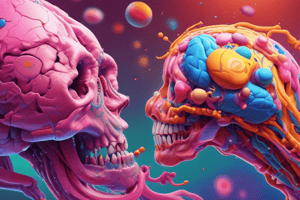Podcast
Questions and Answers
What is the primary action of benzodiazepines in the brain?
What is the primary action of benzodiazepines in the brain?
- Block the reuptake of dopamine
- Increase norepinephrine production
- Inhibit the release of serotonin
- Enhance the effect of gamma-aminobutyric acid (GABA) (correct)
What is a significant risk associated with long-term use of benzodiazepines?
What is a significant risk associated with long-term use of benzodiazepines?
- Tolerance to antidepressant effects
- Development of bipolar disorder
- Physical dependence and withdrawal symptoms (correct)
- Risk of increased anxiety
Which of the following medications is classified as a serotonin norepinephrine reuptake inhibitor (SNRI)?
Which of the following medications is classified as a serotonin norepinephrine reuptake inhibitor (SNRI)?
- Doxepin
- Phenelzine
- Venlafaxine (correct)
- Amitriptyline
Which side effect is commonly associated with serotonin reuptake inhibitors (SSRIs)?
Which side effect is commonly associated with serotonin reuptake inhibitors (SSRIs)?
What is a key consideration when prescribing tricyclic antidepressants?
What is a key consideration when prescribing tricyclic antidepressants?
What is a common withdrawal symptom of benzodiazepines?
What is a common withdrawal symptom of benzodiazepines?
Which medication is primarily used to treat insomnia as a melatonin receptor agonist?
Which medication is primarily used to treat insomnia as a melatonin receptor agonist?
What can happen during the first few weeks of starting an SSRI?
What can happen during the first few weeks of starting an SSRI?
Which of the following is a potential side effect of the medication Duloxetine?
Which of the following is a potential side effect of the medication Duloxetine?
What condition can increase the risk of lithium toxicity?
What condition can increase the risk of lithium toxicity?
Which of the following is a common side effect of lithium toxicity?
Which of the following is a common side effect of lithium toxicity?
What class of medications does Phenelzine belong to?
What class of medications does Phenelzine belong to?
What is a key concern when using first-generation antipsychotics?
What is a key concern when using first-generation antipsychotics?
Which medication class is primarily used to treat ADHD?
Which medication class is primarily used to treat ADHD?
What is the major risk associated with neuroleptic malignant syndrome?
What is the major risk associated with neuroleptic malignant syndrome?
In Eastern cultures, how is health typically viewed?
In Eastern cultures, how is health typically viewed?
Which principle of bioethics refers to promoting good?
Which principle of bioethics refers to promoting good?
What type of commitment allows treatment without patient consent in emergencies?
What type of commitment allows treatment without patient consent in emergencies?
What side effect is more common with second-generation antipsychotics?
What side effect is more common with second-generation antipsychotics?
Which of these is NOT a principle of bioethics?
Which of these is NOT a principle of bioethics?
What is a potential consequence of abrupt cessation of antidepressants?
What is a potential consequence of abrupt cessation of antidepressants?
Which of the following is NOT a symptom of antidepressant discontinuation syndrome?
Which of the following is NOT a symptom of antidepressant discontinuation syndrome?
Which food should be avoided due to high tyramine content when taking MAO inhibitors?
Which food should be avoided due to high tyramine content when taking MAO inhibitors?
Bupropion (Wellbutrin) is primarily used for which two conditions?
Bupropion (Wellbutrin) is primarily used for which two conditions?
Mirtazapine (Remeron) is mainly utilized to treat which of the following?
Mirtazapine (Remeron) is mainly utilized to treat which of the following?
What condition is primarily characterized by excessive serotonin in the brain due to certain medications?
What condition is primarily characterized by excessive serotonin in the brain due to certain medications?
Which medication is commonly used as a mood stabilizer for bipolar disorder?
Which medication is commonly used as a mood stabilizer for bipolar disorder?
Which of the following medications is an anticonvulsant and also used as a mood stabilizer?
Which of the following medications is an anticonvulsant and also used as a mood stabilizer?
Propranolol is primarily used to treat which condition, although it may also help with anxiety?
Propranolol is primarily used to treat which condition, although it may also help with anxiety?
Which symptoms are commonly treated with beta blockers?
Which symptoms are commonly treated with beta blockers?
Flashcards are hidden until you start studying
Study Notes
Short-Term Bipolar and Anxiety
- Short-term bipolar and anxiety are treated with antidepressants, antianxiety/hypnotics, and mood stabilizers.
- Antidepressants are used to treat depression and anxiety by increasing serotonin and norepinephrine levels in the brain.
- Antianxiety/hypnotics are used for short-term anxiety or panic by enhancing the effect of GABA in the brain.
Benzodiazepines
- Benzodiazepines are a class of medications primarily used for their sedative, anti-anxiety, muscle relaxant, and anticonvulsant properties.
- Benzodiazepines enhance the effect of gamma-aminobutyric acid (GABA) in the brain, producing a calming effect.
- Benzodiazepines can cause side effects such as drowsiness, dizziness, fatigue, confusion, and memory impairment.
- With long-term use, benzodiazepines can cause physical dependence and withdrawal symptoms when discontinued.
- Tolerance can develop over time, requiring higher doses to achieve the same therapeutic effect.
- Benzodiazepine overdose is especially risky when combined with other central nervous system depressants like alcohol or opioids.
Melatonin Receptor Agonists
- Melatonin receptor agonists are used to improve sleep quality by promoting sleep.
- Ramelteon and doxepin are examples of melatonin receptor agonists.
Orexin Receptor Antagonists
- Orexin receptor antagonists are used to promote sleep.
- Suvorexant and lemborexant are examples of orexin receptor antagonists.
Serotonin Norepinephrine Reuptake Inhibitors (SNRIs)
- SNRIs increase the levels of serotonin and norepinephrine in the brain, which are often imbalanced in individuals with depression or anxiety.
- SNRIs can cause side effects such as nausea, dizziness, insomnia, increased sweating, dry mouth, and sexual dysfunction.
Selective Serotonin Reuptake Inhibitors (SSRIs)
- SSRIs are often considered to have fewer side effects than other antidepressants.
- Escitalopram, fluoxetine, paroxetine, and sertraline are examples of SSRIs.
- SSRIs can cause side effects such as nausea, insomnia, sexual dysfunction, dry mouth, increased sweating, diarrhea, weight changes, and headaches.
- SSRIs can increase anxiety in the first few weeks of treatment, and it may take 4-6 weeks to receive the full therapeutic effect.
Tricyclic Antidepressants (TCAs)
- TCAs block the reuptake of serotonin and norepinephrine in the presynaptic terminals.
- TCAs are less commonly used due to their side effect profile, but are still utilized in treating depression.
- Amitriptyline, imipramine, and nortriptyline are examples of TCAs.
Monoamine Oxidase Inhibitors (MAOIs)
- MAOIs are used for patients who do not respond to other treatments.
- MAOIs can cause side effects, and abrupt cessation can lead to antidepressant discontinuation syndrome.
- MAOI patients should avoid foods high in tyramine.
Atypical Antidepressants
- Atypical antidepressants work in various ways and are often used when other medications don't work.
- Bupropion, mirtazapine, and trazodone are examples of atypical antidepressants.
Beta Blockers
- Beta blockers are primarily used for cardiovascular conditions, but can also be effective in treating anxiety symptoms such as rapid heart rate, tremors, and sweating.
- Propranolol and atenolol are examples of beta blockers.
Antihistamines
- Certain antihistamines can have sedative effects, promoting relaxation.
- Hydroxyzine is an example of an antihistamine that can be used for anxiety.
Serotonin Syndrome
- Serotonin syndrome is a potentially life-threatening condition caused by too much serotonin in the synapses of the brain.
- It can be caused by medications that increase serotonin levels, such as SSRIs, SNRIs, and MAOIs.
Mood Stabilizers
- Mood stabilizers are used to treat bipolar disorder and schizophrenia.
- Lithium and anticonvulsant medications are examples of mood stabilizers.
- Valproate, carbamazepine, and lamotrigine are examples of anticonvulsant medications that are used to treat bipolar disorder.
Lithium
- Lithium is a mood stabilizer used for bipolar disorder.
- The safe blood level for lithium is 0.6-1.2 mEq/L.
Studying That Suits You
Use AI to generate personalized quizzes and flashcards to suit your learning preferences.




